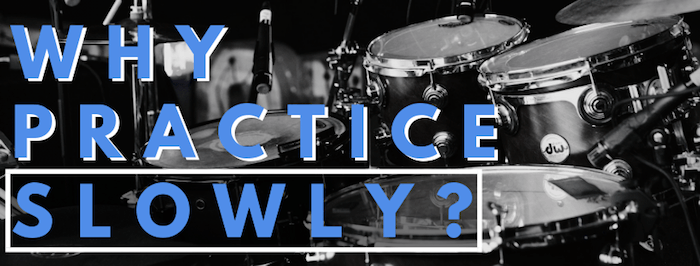
No one learns to play an instrument because they want to play slow. We all want to play the flashy chops at blazing speeds, spotlight shining on us, fan blowing our hair back majestically, crowd going wild. But just like real life, you must first learn to crawl before you can walk. Then, you have to master walking before you can even attempt to run.
In today’s blog, we’re exploring why all the pros and teachers keep giving the same seemingly counterproductive advice: “Practice slowly!”
1. Rhythmic precision
Speed means nothing without rhythmic precision and the pros know that. I would hire Groovin’ Gary, who can play a solid groove without hiccups before I would even consider hiring Speedy Spencer, who flips the beat every time he plays a fill or solo because he tries playing faster than his brain can keep up with.
Groove always triumphs over speed.
Music is comprised of 3 main components: rhythm, melody, and harmony — in that order. Without rhythm, music is just a bunch of sounds played at completely random times. Even most arhythmic passages of music still have some form of a pulse (although it may push and pull). There is no use in playing 16th notes at 220 BPM (beats per minute) if they’re just going to sound sloppy and if you can’t play more than one measure without stopping.

Playing a difficult passage slower will allow you to pick up on some of the rhythmic intricacies that you may not have otherwise noticed. This will set you apart and give you an advantage over some of the other musicians who may only have a surface level understanding of what they are playing. Once you bring the music up to tempo, you will have already eliminated any of the guesswork that usually goes into playing fast and complicated passages of music.
2. Muscle memory
This point is split into 2 sections: note memorization and technique. Now, before all the anatomists out there attack me, muscle memory technically isn’t a thing. Our muscles don’t have miniature brains that can actually memorize things but they do have nerve endings controlled by our brains, which do pick up habits (both good and bad). If your practice consists of you jumping straight to the full tempo of a piece you’re learning and never slowing it down, you will continue to practice your mistakes and those mistakes will become habits.
Memorizing Notes
When you practice slowly, you increase the distance between notes, giving your brain more time to prepare for and predict the next note or grouping of notes. This provides you with a better chance of getting every note right every time, speeding up the process of memorizing the notes and rhythm. The ultimate result is when you speed it up, you will hardly have to think about what you are playing. You can now focus on other things like engaging with the audience/congregation and getting a good tone.
Technique
If you only ever play fast and have never taken the time to practice slowly, there is a high probability that you have some bad habits when it comes to your technique. When you practice at very low speeds, you give yourself the chance to examine your technique very closely to make sure all the mechanics that go into playing are working properly, consistently, and in your favor. As you increase in speed, you may notice some changes in your technique. Some of these changes are normal and need to happen in order to play faster. For instance, a percussionist will need to play with his/her hands lower as they increase in speed (physics, y’all). For the most part, though, you want your technique to remain the same as you go faster.
It is absolutely imperative that you are able to identify the difference between regular changes and negative changes. The last thing you want to do is develop a repetitive strain injury from improper technique that could lead to you needing to temporarily or even permanently quitting your instrument.
The takeaway?
Don’t ignore your music teacher or that person you watch on YouTube when they say to start slow and work your way up. It may be a grueling (and sometimes boring) process but it’s a necessary process that we all go through and the payoff is so worth it to achieve excellence on our instruments!
